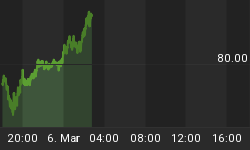Below is an extract from a commentary originally posted at www.speculative-investor.com on 3rd May 2007.
US corporate earnings for the first quarter of the year were generally above analysts' expectations and this has been trumpeted as an important driver of the stock market's recent advance. As usual, though, there's a lot more to the story than meets the eye.
Firstly, it is worth noting that expectations were only exceeded because the bar had previously been lowered. Specifically, company managements did a stellar job of getting analysts to lower their forecasts and, as a result, these companies only had to earn what the analysts had originally expected them to earn in order to come in well ahead of the revised (lowered) expectations.
The lowering of the 'expectations bar' is only a small piece of the puzzle, however, because a) the price action tells us that the market never actually fell for the lowered guidance (there's often a difference between the consensus expectation of analysts and the market's expectation), and b) the stock market rally continues to be a global phenomenon. When attempting to explain the stock market's recent strength we therefore needn't devote much time to the expectations game played by US company managements and Wall Street analysts.
Secondly, in a recent article Doug Kass makes the good point that the quality of earnings growth reported by corporate America during the latest quarter was poor because a significant chunk of it was due to the boost to internationally-generated profits provided by the US dollar's weakness.
There's a comment towards the end of the Kass article to the effect that while most people who think about how the currency market could impact the future performance of the stock market appear to be focused on the risk posed by dollar weakness, there might actually be more potential for a problem to stem from dollar STRENGTH. We agree -- substantial strength in the dollar would put DOWNWARD pressure on US corporate earnings. But while we think the performance of the currency market is a critical factor in the stock market's rally we don't think the foreign-exchange-related boost (or lack thereof, should the US$ strengthen) to US company earnings is the most important aspect of the currency-equity relationship at this time. The fact that it's a GLOBAL, not a US, stock market rally tells us this much in that any benefit achieved by US multi-nationals due to US$ weakness relative to the euro will have been offset by the lowered earnings of European multi-nationals; and yet the senior European stock markets have been performing at least as well as the US stock market.
Thirdly, skeptics have rightly pointed out that per-share earnings have been elevated by corporations buying back their own shares. For example, a company that generates the same total profit from one year to the next can report a 10% rise in its profit per share by buying back 10% of its shares. Unless the buy-back occurs at a time when the company's assets are being substantially under-priced by the stock market it cannot add long-term value because money used in re-purchasing stock is money that cannot be used to expand/improve the business; but it can certainly provide a boost in the short-term, which, in many cases, is where the primary focus of senior management lies.
Again, though, the corporate rush to buy-back stock appears to be mostly a US phenomenon and therefore doesn't really explain the persistent strength in equities throughout the world.
The key, we suspect, lies in the inter-relationship between the US$, the euro and the Yen. Equities have done well as the US$ has weakened relative to the euro and as the Yen has weakened relative to the US$, which means that equities have benefited as the Yen has become very weak relative to the euro. This relationship has prevailed for more than two years, but over the past 11 months -- the period covered by the following chart-based comparison of the S&P500 Index and the euro/Yen exchange rate -- it has become stronger than ever.
Now, the tight positive correlation between the stock market and euro/Yen evident on the following chart is not necessarily causal; however, it probably is causal in that the borrowing (shorting) of Yen in order to buy the higher-yielding euro -- a trade that pushes the euro upward against the Yen -- has been and continues to be an important source of the liquidity elevating stock markets throughout the world.

So, when assessing the risks for the broad stock market it probably makes sense to focus on the potential for Yen strength against the euro rather than on the potential for the Dollar Index to break below 80. The inter-market relationships of the past year certainly suggest that substantial strength in the Yen versus the euro would be more problematical for equities than would additional weakness in the US$ against the euro; and in our opinion, a sharp rise in Yen/euro has a much higher probability of occurring over the next few months than does a major breakdown in the Dollar Index.
In a nutshell, equities have fared well as the US$ has weakened relative to the euro and as the Yen has weakened relative to the US$ (resulting in substantial weakness in the Yen relative to the euro). The worst case as far as the short-term prospects for global equities are concerned, therefore, would probably entail US$ strength relative to the euro and Yen strength relative to the US$.















